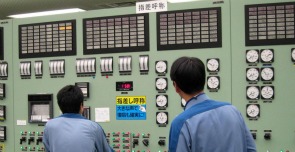The TEPCO, the operator of Japan's Fukushima nuclear power plant, damaged by the earthquake and tsunami of 11 March, officially requested the help of the Japanese government to deal with the financial burden arising from the accident. For its part, the Japanese Prime Minister, Naoto Kan, has announced that it will give up his salary until the nuclear crisis will not be finished even if it continues to receive the compensation they deserve as a Member.
The request for financial assistance needed to cope with the huge damages in the Fukushima No. 1 nuclear crisis in the system, was presented today by a number of TEPCO, Masataka Shimizu, the Japanese Minister for Industry, Banro Kaieda , citing the shortage of capital. "We will do our best to rationalize the resources available," said Shimizu, who has announced his intention to return the salary together with other leaders.
The number one TEPCO has also pledged to further reduce operating costs, resulting from 50 percent to 60 percent cut in salaries of top managers from this month, and sell large assets of the group. In addition to the compensation, the operator will have to find additional funds electric, at least one million yen (about € 8.7 billion) to boost energy production in thermal power stations, a necessity following the closure of nuclear installations the earthquake of 11 March.
The Japanese government, meanwhile, is considering the establishment of an insurance payment of compensation for the post Fukushima, in the event that TEPCO is unable to cope and to manage the consequences of other possible nuclear accidents in the future . Meanwhile, hundreds of inhabitants of a village not far from central, Kawauchi, less than 20 kilometers southwest of Fukushima, were allowed to briefly visit their homes for the first time the nuclear, to retrieve their belongings and care for the animals.
The former residents, who in recent months have had to move into shelters or at home of acquaintances, were carried by bus to the old houses, where they will stay a couple of hours wearing a protective suit and equipped with a dosimeter and a transmitter to communicate with the authorities.
Can retrieve only a few things that may go into a special bag, however, except animals, food or liquids. At the end of the visit, will have to undergo a radiation monitoring. At the start of the bus, some of the elders said they would review their animals and take photographs of their families.
Thousands of dogs, cats, cows and chickens were enacted after the evacuation to the village after the nuclear accident. 


The request for financial assistance needed to cope with the huge damages in the Fukushima No. 1 nuclear crisis in the system, was presented today by a number of TEPCO, Masataka Shimizu, the Japanese Minister for Industry, Banro Kaieda , citing the shortage of capital. "We will do our best to rationalize the resources available," said Shimizu, who has announced his intention to return the salary together with other leaders.
The number one TEPCO has also pledged to further reduce operating costs, resulting from 50 percent to 60 percent cut in salaries of top managers from this month, and sell large assets of the group. In addition to the compensation, the operator will have to find additional funds electric, at least one million yen (about € 8.7 billion) to boost energy production in thermal power stations, a necessity following the closure of nuclear installations the earthquake of 11 March.
The Japanese government, meanwhile, is considering the establishment of an insurance payment of compensation for the post Fukushima, in the event that TEPCO is unable to cope and to manage the consequences of other possible nuclear accidents in the future . Meanwhile, hundreds of inhabitants of a village not far from central, Kawauchi, less than 20 kilometers southwest of Fukushima, were allowed to briefly visit their homes for the first time the nuclear, to retrieve their belongings and care for the animals.
The former residents, who in recent months have had to move into shelters or at home of acquaintances, were carried by bus to the old houses, where they will stay a couple of hours wearing a protective suit and equipped with a dosimeter and a transmitter to communicate with the authorities.
Can retrieve only a few things that may go into a special bag, however, except animals, food or liquids. At the end of the visit, will have to undergo a radiation monitoring. At the start of the bus, some of the elders said they would review their animals and take photographs of their families.
Thousands of dogs, cats, cows and chickens were enacted after the evacuation to the village after the nuclear accident.


- Crisis In Japan: Radiation Detected In Seawater; Frustration Grows (28/03/2011)
- Japan may buy Tepco stake, replace management- Yomiuri (10/05/2011)
- Japan many buy Tepco stake, replace management- Yomiuri (09/05/2011)
- Irish V Jap golden circle Culture (10/05/2011)
- Japan Estimates Tepco Compensation of $49 Billion, Asahi Says - Bloomberg (03/05/2011)
No comments:
Post a Comment